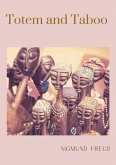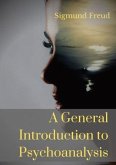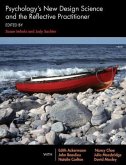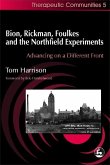W. H. R. Rivers
Instinct and the Unconscious
A Contribution to a Biological Theory of the Psycho-Neuroses
W. H. R. Rivers
Instinct and the Unconscious
A Contribution to a Biological Theory of the Psycho-Neuroses
- Broschiertes Buch
- Merkliste
- Auf die Merkliste
- Bewerten Bewerten
- Teilen
- Produkt teilen
- Produkterinnerung
- Produkterinnerung
First published in 1922, this book examines the uses of psycho-therapy in the treatment of the psycho-neuroses of war.
Andere Kunden interessierten sich auch für
![Totem and Taboo: A 1913 book by Sigmund Freud, the founder of psychoanalysis, in which the author applies his work to the fields of arc Totem and Taboo: A 1913 book by Sigmund Freud, the founder of psychoanalysis, in which the author applies his work to the fields of arc]() Sigmund FreudTotem and Taboo: A 1913 book by Sigmund Freud, the founder of psychoanalysis, in which the author applies his work to the fields of arc17,99 €
Sigmund FreudTotem and Taboo: A 1913 book by Sigmund Freud, the founder of psychoanalysis, in which the author applies his work to the fields of arc17,99 €![Cultural Competence and Healing Culturally Based Trauma with EMDR Therapy Cultural Competence and Healing Culturally Based Trauma with EMDR Therapy]() Cultural Competence and Healing Culturally Based Trauma with EMDR Therapy95,99 €
Cultural Competence and Healing Culturally Based Trauma with EMDR Therapy95,99 €![A General Introduction to Psychoanalysis: A set of lectures given by Psychoanalyst and founder of the Psychoanalytic theory Sigmund Freud, offering an A General Introduction to Psychoanalysis: A set of lectures given by Psychoanalyst and founder of the Psychoanalytic theory Sigmund Freud, offering an]() Sigmund FreudA General Introduction to Psychoanalysis: A set of lectures given by Psychoanalyst and founder of the Psychoanalytic theory Sigmund Freud, offering an22,99 €
Sigmund FreudA General Introduction to Psychoanalysis: A set of lectures given by Psychoanalyst and founder of the Psychoanalytic theory Sigmund Freud, offering an22,99 €![Beyond the Pleasure Principle Beyond the Pleasure Principle]() Sigmund FreudBeyond the Pleasure Principle16,99 €
Sigmund FreudBeyond the Pleasure Principle16,99 €![Meltzer in Venice Meltzer in Venice]() Meltzer in Venice37,99 €
Meltzer in Venice37,99 €![Psychology's New Design Science and the Reflective Practitioner Psychology's New Design Science and the Reflective Practitioner]() Psychology's New Design Science and the Reflective Practitioner41,99 €
Psychology's New Design Science and the Reflective Practitioner41,99 €![Bion, Rickman, Foulkes and the Northfield Experiments Bion, Rickman, Foulkes and the Northfield Experiments]() Tom HarrisonBion, Rickman, Foulkes and the Northfield Experiments73,99 €
Tom HarrisonBion, Rickman, Foulkes and the Northfield Experiments73,99 €-
-
-
First published in 1922, this book examines the uses of psycho-therapy in the treatment of the psycho-neuroses of war.
Hinweis: Dieser Artikel kann nur an eine deutsche Lieferadresse ausgeliefert werden.
Hinweis: Dieser Artikel kann nur an eine deutsche Lieferadresse ausgeliefert werden.
Produktdetails
- Produktdetails
- Verlag: Cambridge University Press
- Seitenzahl: 286
- Erscheinungstermin: 27. Januar 2014
- Englisch
- Abmessung: 229mm x 152mm x 17mm
- Gewicht: 468g
- ISBN-13: 9781107674936
- ISBN-10: 110767493X
- Artikelnr.: 40579051
- Herstellerkennzeichnung
- Libri GmbH
- Europaallee 1
- 36244 Bad Hersfeld
- gpsr@libri.de
- Verlag: Cambridge University Press
- Seitenzahl: 286
- Erscheinungstermin: 27. Januar 2014
- Englisch
- Abmessung: 229mm x 152mm x 17mm
- Gewicht: 468g
- ISBN-13: 9781107674936
- ISBN-10: 110767493X
- Artikelnr.: 40579051
- Herstellerkennzeichnung
- Libri GmbH
- Europaallee 1
- 36244 Bad Hersfeld
- gpsr@libri.de
W.H.R. Rivers was a distinguished early twentieth-century English anthropologist, neurologist, ethnologist, and psychiatrist, known for his pioneering work in several fields. Born in 1864, Rivers made notable contributions to the understanding of the human mind and society. Perhaps most famously, he authored 'Instinct and the Unconscious: A Contribution to a Biological Theory of the Psycho-Neuroses' (1920), which provided innovative insights into human psychology and the role of instinctual behavior. His literary style is often categorized by a clinical approach, reflecting his scientific background, and seamlessly integrates empirical observations with theoretical discussions. Rivers's interdisciplinary approach bridged the gap between medicine and anthropology. He gathered much of his data through fieldwork, notably during the Torres Strait Expedition of 1898, where he conducted pioneering studies of the inhabitants' sensory processes and social structures. His work laid the groundwork for future anthropological and psychological research, including the development of participant observation as a method. Rivers's influence extended to his service as a psychiatrist during World War I, where he treated soldiers for shell shock, now known as post-traumatic stress disorder (PTSD), and argued for the importance of therapy. Rivers passed away in 1922, leaving behind a legacy that has been critical to the development of social sciences.
Preface
1. Introduction
2. The unconscious
3. Suppression
4. Suppression and inhibition
5. The context of the unconscious
6. The nature of instinct
7. The danger-instincts
8. Suppression and the all-or-none principle
9. Instinct and suppression
10. Dissociation
11. The 'complex'
12. Suggestion
13. Hypnotism
14. Sleep
15. The psycho-neuroses
16. Hysteria or substitution-neurosis
17. Other modes of solution
18. Regression
19. Sublimation
Appendix I. Freud's psychology of the unconscious
Appendix II. A case of claustrophobia
Appendix III. The repression of war experience
Appendix IV. War-neurosis and military training
Appendix V. Freud's conception of the 'censorship'
Appendix VI. 'Wind-up'
Appendix VII. Psychology and the war
Appendix VIII. The instinct of acquisition
Index.
1. Introduction
2. The unconscious
3. Suppression
4. Suppression and inhibition
5. The context of the unconscious
6. The nature of instinct
7. The danger-instincts
8. Suppression and the all-or-none principle
9. Instinct and suppression
10. Dissociation
11. The 'complex'
12. Suggestion
13. Hypnotism
14. Sleep
15. The psycho-neuroses
16. Hysteria or substitution-neurosis
17. Other modes of solution
18. Regression
19. Sublimation
Appendix I. Freud's psychology of the unconscious
Appendix II. A case of claustrophobia
Appendix III. The repression of war experience
Appendix IV. War-neurosis and military training
Appendix V. Freud's conception of the 'censorship'
Appendix VI. 'Wind-up'
Appendix VII. Psychology and the war
Appendix VIII. The instinct of acquisition
Index.
Preface
1. Introduction
2. The unconscious
3. Suppression
4. Suppression and inhibition
5. The context of the unconscious
6. The nature of instinct
7. The danger-instincts
8. Suppression and the all-or-none principle
9. Instinct and suppression
10. Dissociation
11. The 'complex'
12. Suggestion
13. Hypnotism
14. Sleep
15. The psycho-neuroses
16. Hysteria or substitution-neurosis
17. Other modes of solution
18. Regression
19. Sublimation
Appendix I. Freud's psychology of the unconscious
Appendix II. A case of claustrophobia
Appendix III. The repression of war experience
Appendix IV. War-neurosis and military training
Appendix V. Freud's conception of the 'censorship'
Appendix VI. 'Wind-up'
Appendix VII. Psychology and the war
Appendix VIII. The instinct of acquisition
Index.
1. Introduction
2. The unconscious
3. Suppression
4. Suppression and inhibition
5. The context of the unconscious
6. The nature of instinct
7. The danger-instincts
8. Suppression and the all-or-none principle
9. Instinct and suppression
10. Dissociation
11. The 'complex'
12. Suggestion
13. Hypnotism
14. Sleep
15. The psycho-neuroses
16. Hysteria or substitution-neurosis
17. Other modes of solution
18. Regression
19. Sublimation
Appendix I. Freud's psychology of the unconscious
Appendix II. A case of claustrophobia
Appendix III. The repression of war experience
Appendix IV. War-neurosis and military training
Appendix V. Freud's conception of the 'censorship'
Appendix VI. 'Wind-up'
Appendix VII. Psychology and the war
Appendix VIII. The instinct of acquisition
Index.








